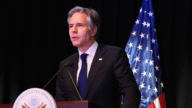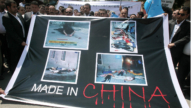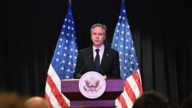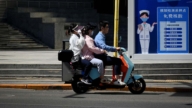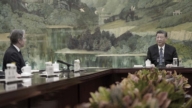【新唐人2012年7月13日訊】外界越來越發現,中國大部分的財富集中在少數的權貴大家族手中,中國的貧富差距比任何其他經濟體都要大。那麼,中國的權貴階層,是如何利用政治權力和影響力來聚斂財富呢?下面請看本臺記者的報導。
11號,英國《金融時報》用整版的版面,分析評論中國的權貴階層,如何利用政治權力和影響力,聚斂財富。
文章說,中國一、兩百家政治權貴壟斷著中國絕大部分財富,控制著全中國經濟命脈。隨著中國經濟放緩,同時「太子黨」和新權貴階層財富的增長,人們開始擔心中國經濟的運轉方式是為了使極少數的政治權貴人士受益。
政治經濟評論家陳志飛表示,中國的經濟是一個畸形發展的模式,主要體現在:中國經濟的發展運作是由權貴來操控。
陳志飛:「它表面上的頭銜看起來很標準,跟國際也接軌,比如叫股份有限公司,有董事會,有董事長,但實際上它最後的最主要的推手,最根本的利益階層還是中國共產黨。」
陳志飛指出,中國的政治和經濟已經密不可分,中共的高層官員利用手中的權力,攫取最大利益,這個現象從太子黨從事各種各樣的企業可以看出。
據資料顯示,政府和資本的結合,是前中共總書記江澤民上臺之後經濟發展模式的核心之一。江澤民兒子江綿恆1999年前後入駐多家國有企業後,江澤民就公開鼓吹「國企改革和發展」,然後,江澤民家族就利用國企,將大量資產轉移到海外。國際清算銀行2002年12月發現的無人認帳的20多億外流美金,據傳是江澤民十六大前為自己準備後路而轉移到海外去的。
美國「南卡羅來納大學」教授謝田表示,中國所謂的改革開放,經濟搞活,實際上已經把全中國60%以上的財富,都壟斷在共產黨權貴們的手中。
美國「南卡羅來納大學」教授謝田:「它這個權利不受任何限制,也就是說用它的政治權力直接轉化為經濟權利,直接把那些國有企業、最壟斷、最盈利的企業納入他們手中,然後就可以直接操控整個經濟,把所有的財富拿過來。」
原重慶市委書記薄熙來倒臺後,薄熙來案讓全世界見證了中共官員驚人貪腐的一面。
2007年,薄熙來當選為中共中央政治局委員,同年又接任中共重慶市委書記。之後,重慶的公安、司法、檢察院等全部集權於他一身,當他要動用這些力量的時候,完全可以超越法律之上,因此,薄熙來的妻子也自然分享了丈夫的政治權利。
日本《朝日新聞》最近報導說,谷開來承認,從90年代前期開始到被捕之前,她利用薄熙來的地位,收受有關企業的現金,並轉移了60億美元到美國和英國的銀行帳戶裡。
謝田指出,大部分西方正常國家都有法律制度制衡官員權力,而且由國會和議會來決定官員的薪水,官員腐敗的話,有輿論的獨立監督,但在中國,這些都不具備。
因此,外界評論說,中共高層官員的私生活、資產、經商情況以及親屬情況都被認為是國家機密,國家媒體也利用各種手段阻礙外界獲得任何有關信息。不過,評論說,今天是網路時代,中國富人的財富再也無法隱藏了。
採訪/朱智善 編輯/唐睿 後製/君卓
Rich & Powerful Families Control China Economic Lifeline
More and more people in China realized that most
of the wealth of China is concentrated in the hands of a few rich and powerful families.
In China, the gap between the rich and poor is larger than
any other economies.
How do the powerful Chinese families use political power
to collect their wealth? Let’s see the report.
On July 11, the British “Financial Times”
used a full page to analyze
how the nomenklatura use the political power
and influence to collect wealth.
It reported that one or two hundred nomenklatura occupy
the vast majority of Chinese wealth, and control the economy lifeline of the entire China.
With the slowing down of China’s economy, and the wealth
of princeling and nomenklatura growing,
people are worried that the operation of China’s economy
is only benefiting the very small number of nomenklatura.
Chen Zhifei, a political and economic commentator, said
the development of China’s economy is an abnormal model,
which mainly reflects in the development of the economy
being controlled by nomenklatura.
Chen Zhifei: “On the surface, their titles are standard
and similar to the (titles used) internationally.
For example, it is called a 『corporation.』
It has a 『board,』 『chairman,』 and so on.
In fact, the main pushing hand, the basic benefit group
is the Chinese Communist Party (CCP).”
Chen Zhifei pointed out that China’s politics and economics
are inseparable, and the CCP senior officials use their power to grab the most benefit.
An example of this is the phenomenon of princelings
operating a variety of companies.
According to statistics, the combination of government
and capital is one of the core models that the former CCP secretary, Jiang Zemin, promoted.
Around 1999, Jiang Mianheng, son of Jiang Zemin,
took positions in many state-owned enterprises.
Jiang Zemin then advocated the “reform and development
of state-owned enterprises”
which helped Jiang’s family move a big amount of
state-owned assets overseas.
In December 2002, the Bank for International Settlements
discovered more than 2 billion USD without an owner.
It was said that these funds are part of the wealth that
Jiang Zemin moved out of China way before the 16th National congress.
Xie Tian, a professor from U.S. University of South Carolina,
said that the so-called reform and opening up to activate
the economy has given the opportunity to the CCP’s
nomenklatura to grab more than 60% of China’s wealth.
Xie Tian: “There’s no ban to limit CCP’s power.
In another words, CCP uses political force to change into
an economy that monopolizes the state-owned enterprises and controls the best enterprises.
Then it can control the whole economy and grab
the whole wealth.”
The fall of former CCP Chongqing secretary Bo Xilai
showed the whole world the corruption of CCP officials.
In 2007, Bo Xilai was promoted to be a member
of the Politburo, and he took the CCP secretary of Chongqing.
Then, he controlled the public security, judicial,
and procuratorate of Chongqing.
When he wanted to use these powers, he skipped
the limit of the law and did whatever he wanted.
Furthermore, his wife Gu Kailai shared his political power.
The Japanese “Asahi Shimbun" reported recently that
Gu Kailai admitted that from the early 1990s,
she used Bo Xilai’s position to take bribes
from different enterprises.
Before her arrest, she transferred 6 billion USD
to bank accounts in U.S. and U.K.
Xie Tian pointed out that in most of the Western countries,
law limits the official’s power.
Congress and Parliament decide officials’ salary.
If any official corrupts, the public will monitor it
via independent media. But in China, there’s not this system.
Therefore, outsiders comment that in China,
the private life, assets, business and relatives of senior officials
are state secrets, and state-owned media also
block the information channel with a variety of means.
However, in the current Internet era,
the wealth of China’s rich can’t stay hidden any longer.



